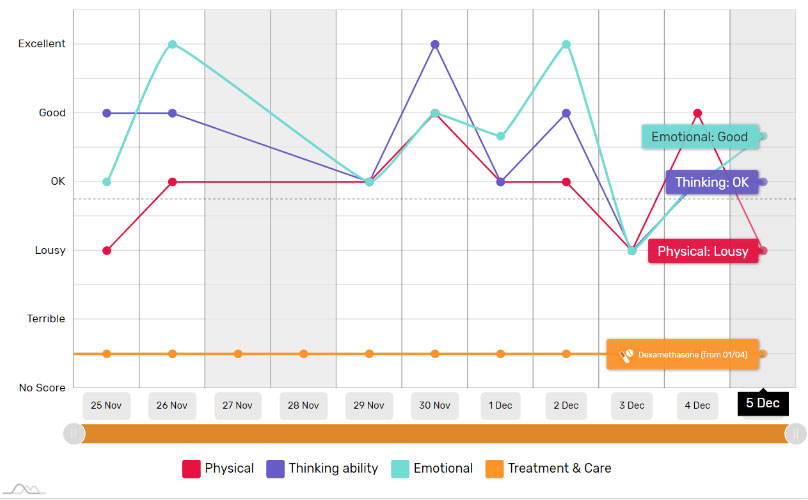Treating brain tumour epilepsy
Treating brain tumour epilepsy can be difficult because of the other symptoms of the tumour. Because of this, treatment will be customised by your healthcare team. Anti-epileptic drugs are the main form of treatment, but surgery is also a possibility.
On this page, we’ll cover:
- Brain tumour epilepsy treatment
- Anti-epileptic drugs (AEDs)
- Neurosurgery
- Other treatments and complementary therapies
Brain tumour epilepsy treatment
Treating brain tumour epilespsy can be particularly complex and difficult due to the additional symptoms that having a brain tumour causes.
The variety of tumours (type, location and grade), tumour symptoms and treatments all interact with the variety of seizure types.
As a result, some treatments for epilepsy are not suitable for you. Or you may have to try several treatments before you find the one that is best for you.
Anti-epileptic drugs (AEDs)
AEDs are the main form of treatment for most people with epilepsy, including brain tumour-related epilepsy.
AEDs cannot cure epilepsy, but they can help stop seizures from happening. You may have to have more than one AED.
As with all medicines, AEDs can cause side-effects. These could be skin rashes, bowel problems, fatigue and headaches. You should report any skin rashes, or any severe reaction to your doctor.
If you have a brain tumour and are thought to be at high risk of having a seizure, you may be given AEDs even before you’ve had a seizure. This may be the case if you’re having surgery.
Your specialist will prescribe the drug that’s most suitable for you depending on the:
- type(s) of seizure you have
- interactions with other medications or therapies (that you may be receiving as part of your treatment for your brain tumour)
- impact of a drug’s side-effects on any other effects your brain tumour may be causing, e.g. problems with cognitive function (thinking, memory, attention).
You’re likely to be given what are known as second generation (newer) drugs. These drugs are preferred for patients with a brain tumour because they tend to have fewer interactions with other drugs, less of a negative effect on other therapies you may be receiving, and have fewer side-effects.
Some people with brain tumours find their epilepsy does not respond so well to drugs.
The Epilepsy Society has a list of AEDs with the common side-effects.
Neurosurgery
Surgery to remove the area of the brain causing the seizures is occasionally used to reduce or stop seizures. However, the presence of a brain tumour makes things more complicated, and surgery might not be the most appropriate treatment option.
Other treatments and complementary therapies
Other treatments, though used in the treatment of non-brain tumour-related epilepsy, are not suitable or are rarely used for treating brain tumour epilepsy.
There’s a lot of information online and elsewhere about various complementary therapies for the treatment of epilepsy. Some people say that various complementary therapies work for them. However, as yet there’s no scientific evidence to suggest that they do reduce seizures.
If you decide to use a complementary treatment, speak to your doctor first. They will be able to advise if the treatment may cause problems with your epilepsy or AEDs, or other treatments you’re having for your brain tumour.
This includes any dietary or vitamin supplements and, particularly, herbal medicines, as some (such as St John’s Wort) can interfere with AEDs and lead to loss of seizure control.
In some cases, such as the ketogenic diet, this is because they need to be done under the supervision of a healthcare professional. Or in the case of cannabis-derived products, there are legal issues, as well as possible interactions with other medications you may be taking.
Anxious about having a seizure?
Not knowing when your seizures might happen can make you feel insecure about being out in public or alone at home. Use BRIAN’s seizure tracker to plot your seizures against possible triggers, so you can try to identify and avoid them.


Join our online support community
Our online support groups are a great place to connect with other people affected by a brain tumour and share your experiences.
Download our seizure factsheets
An introduction to seizures (epilepsy) and brain tumours – PDF
Find out more about seizures (epilepsy) and brain tumours – including more information about what happens during different seizures – in the full fact sheet.
Treatment for seizures (epilepsy) and brain tumours – PDF
Find out more about the treatment for seizures (epilepsy) and brain tumours, including ketogenic diet and cannabis-derived products.
Living with seizures – PDF
Download our information about living with seizures in a printable format.
Support and Information Services
Research & Clinical Trials Information
You can also join our active online community.

Get support
If you need someone to talk to or advice on where to get help, our Support and Information team is available by phone, email or live-chat.
Recommended reading
Share your experiences and help create change
By taking part in our Improving Brain Tumour Care surveys and sharing your experiences, you can help us improve treatment and care for everyone affected by a brain tumour.